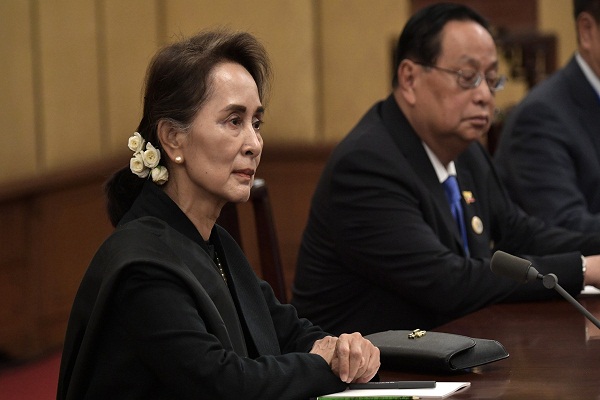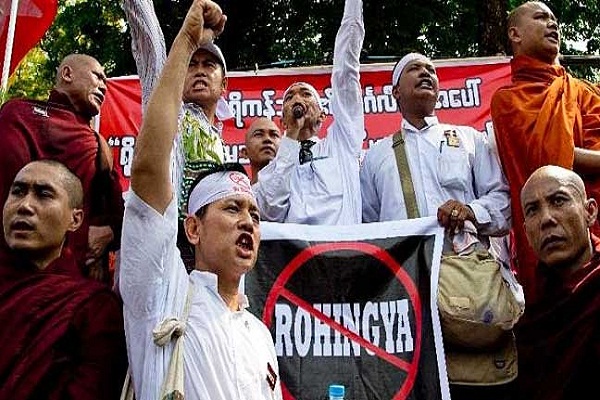Rohingya Crisis Roots Older than Myanmar Independence: Scholar

“Most people seem to be attracted to a simplified interpretation of the Rohingya-Arakan-Rakhine situation. When they hear about the intrinsic complexity of this situation they roll their eyes and their minds partially close down, Robert Anderson told IQNA in an interview.
Robert Anderson was trained as an anthropologist at the University of Chicago and is now professor emeritus of communication at Simon Fraser University in Vancouver Canada. He first visited Myanmar in 1962 when he was nineteen, and first visited the Arakan/Rakhine coast in 1973. He has been to the country many times and is now writing a history of Myanmar in the 1940s. He has been to the banks of the Naf River but has never crossed over. He says ‘I am not an expert about the Rohingya. Real experts are much closer to the scene than I can be here in Canada; expertise is found among the Rohingya and their immediate neighbors, and real experts speak several languages.’ He is also assisting the University of Yangon with a new graduate Program on Environmental Studies.
Following is the full text of the interview:
IQNA: In recent years, we have seen pressure and persecution against the Rohingya Muslim minority in Myanmar reach its peak and a kind of genocide against this minority has taken place in Myanmar. What are the roots of these actions by the Myanmar government?
Anderson: Most people seem to be attracted to a simplified interpretation of the Rohingya-Arakan-Rakhine situation. When they hear about the intrinsic complexity of this situation they roll their eyes and their minds partially close down. Why? Because the roots are even deeper and older than the origin of Myanmar as an independent and military-run state in 1948. This northern part of Arakan, the older geographic term the Rohingya prefer, has always been resource-rich and labor-poor. People have come there from south-east Bengal for that reason, perhaps most of them starting in the sixteenth century, but of course other indigenous peoples settled and evolved there long before that. The Arakan kingdom, in which the present Rohingya territories lay, had huge influence in the sixteenth century, and controlled the port of Chittagong and some of the southeast land of Bengal beyond it. That link with Chittagong was never broken in the Arakan imagination. The important recent scholar to read on this subject is the eighteenth century historian Jacques Leider.

Inspired by Leider’s work I decided to study records of 1790 to 1802 in the British Library, and those documents revealed the first (known) wave of 25,000 refugees coming from Arakan over the Naf River into Bengal in 1797-98, trying to avoid the harsh occupation of their territories by the ‘Bumah Army’ of the Mandalay-based Ava king. That was a very large wave of people in the late 18th century in this sparsely populated country. Being both Buddhist and Muslim those refugees in 1798 were settled together at a place now called Cox’s Bazaar. Cox was appointed Commissioner for Refugees in 1798-99 and did what he could to enable those people to settle down, before he died there of malaria in 1800. And thousands of refugees stayed on, cultivating unoccupied land. This is the very same spot where 700,000 Rohingya are living now, named after that first commissioner for refugees. A series of waves of refugees constitute the histories of these people. The recent wave is not new, recent ones also occurred in 1978, 1992. The pressures differ slightly in each wave because history does not repeat itself no matter what simplifications we make of it. But these groups now called Rohingya have been tangled up with each other for centuries, crossing back and forth over the Naf River. But now Bangladesh has no unoccupied land for them and Myanmar does not consider them citizens and does not want to accept them. So the Myanmar government (ie the Army) is both leading the pressure on them and responding to social expectation in the Bamar society to secure the borders against unreliable or troublesome frontier peoples, including ‘guests’ like the Rohingya. And this is not the full complexity of their situation. Therefore many people – who should know better - close their minds to what is going on there, saying a solution is too complicated.
I should emphasize that even the use of the word ‘Rohingya’ is contested. Today it is used variably by many groups and is seldom used officially at all in Myanmar. What it might have meant in the middle of the 20th century is not what it means in the 21st century.
IQNA: One of the criticisms leveled at Aung San Suu Kyi is her lack of explicit stance on Myanmar military crimes. To what extent is Aung San Suu Kyi to blame for this situation for the Rohingya minority?
Anderson: Suu Kyi’s father was assassinated when she was an infant in 1947, but he was subsequently re-constructed as the heroic father of the Army and the founder of the nation. Despite her move abroad with her mother, and her marriage in the UK, she identified part of herself with the Army; when she was emprisoned by them she was uniquely able to address them as ‘my brothers’. This embarrassed them and shamed some, but not enough to limit them in their rough and threatening behaviour toward what the 2008 Constitution called the “National Races”. The Army has been in conflict with sections of those non-Burmese (Bamar) groups for generations. But most of the Army officers’ wives admire Ms Suu Kyi greatly, and the officers know she is favored by most of the people. She has become like a Prime Minister, and her NLD Party is responsible for all ministries except the controlling ministries (border security and frontier development, police, defense, etc).

I do not think she is personally in favor of the persecution of the Rohingya, but she knows that the Army and many Burmans classify the Rohingya as outsiders, as Muslim migrants from Chittagong, as ‘guests’. They are not a ‘National Race’ and are not on an official census list of about 135 ethnic groups. Though this ‘migrant’ narrative is true only for a fraction of the Rohingya, that fraction of the truth is politically effective in the voting heartland of Myanmar. That may be why she has not explicitly censored the Army, but mentioned the investigation of their military crimes. An articulate and loud movement called Ma Ba Tha relentlessly pushed that definition among Bamar Buddhists, that these people are just guests and migrants, not worthy of rights. And those monks are not alone – even other Buddhists who do not approve of that Ma Ba Tha movement are nevertheless genuinely worried about the future and integrity of Buddhism in Myanmar. They saw the Army piously and opportunistically cultivate its relations with the monasteries from 1990 onward, and they are concerned about that perverse influence too. That is how we must understand the Establishment’s disinterest in the Rohingyas’ predicament.
IQNA: Some believe that religious differences between Buddhists and Muslims in Myanmar are the only excuse for suppressing the Rohingya minority. How true is this?
Anderson: It is true that Bamar-speaking citizens of Myanmar who identify as Buddhist are concerned about the relative number and influence of Muslims inside the country. Even Buddhists born and raised on the Arakan coast (now called Rakhine State) were concerned by the number of Muslim residents from the 1920s onward; this anxiety is not new and other Burmese expressed it too. But there have been Muslim communities in this part of Myanmar for at least five hundred years, and in the 18th and 19th centuries these communities enlarged and stabilized themselves along the Arakan coast. From time to time, since 1948, the Myanmar state has found it convenient to suppress minority communities and used force to do so if necessary, particularly on the border areas such as the northern Arakan coast where the Rohingya are now concentrated.

So this minority, which is actually constructed of different ethnicities (Mro, Khami, Daignet, Kaman Muslims from Ramree Island, and Rohingya), are poor and weakly defended groups which can easily be pushed around, particularly if they seem to support a militant independence movement like the one known as ARSA which attacked a twelve border-police posts in 2017. Although a prejudice in parts of the population has indeed been built up over the recent years it is not simply a general Buddhist prejudice about all Muslims in Myanmar which is a reason for suppression of the Rohingya peoples. There are counter-movements for pluralism too, multi-party public declarations and demonstrations of solidarity with Muslims and other minorities. One needs to study these historic movements in this specific context in order to understand the Rohingyas’ suppression.
IQNA: How do you think the Myanmar government can be forced to stop killing and persecuting the Rohingya minority?
Anderson: It’s unlikely that Myanmar can be forced to stop its fighting with minorities but its government can be influenced to negotiate and honor cease fires and peace agreements with them. Most of the conflicting parties are trying to find peace but the two militant ‘Arakan’ guerilla groups in northern Rakhine state prove that such agreements, if any, are unstable. The UN’s Security Council has no military force at its disposal and has members (China and perhaps Russia) which shield Myanmar from an ultimatum to stop. ASEAN has two members (Indonesia, Malaysia) which have military resources and large majority Muslim populations, but their pressure alone is insufficient; moreover their treatment of their own minorities is not critic-proof. My own view is that no nation’s treatment of its minorities is critic-proof. Indonesian or Malaysian soldiers could, however, if properly trained and informed, act a peace-keepers. The UN could present a well-trained peace keeping unit. China could force Myanmar to stop killing only if such activities interfered with the Chinese pipeline and superport investments quite far to the south of the Rohingya heartland. If the lucrative coastal tourist sites in southern Rakhine were completely shut down by conflict, then Myanmar capital circles would lean on the military with an economic argument, but it might not be effective. The kind of public demonstrations which occurred in 2014-15 against the (Chinese and Burmese) construction of the big dam in Kachin State would not likely occur in favour of the Rohingya.
IQNA: Could the sudden appearance recently of two Myanmar soldiers in The Hague alter the situation in the Rohingya case?"
Anderson: If their testimony is credible and deemed admissable by the International Court of Justice (in the Gambia vs Myanmar case) then that court could test and circulate the soldiers' evidence of the systematic and violent expulsion of people from their lands in the disguise of clearing parts of the northern Rakhine State's frontier area of anti-government terrorists.
IQNA: What is the situation of other racial and religious minorities in Myanmar?
Anderson: The situation of other ethnic and religious minorities in Myanmar varies extremely. In Kachin State there is more or less open and prolonged combat with the Myanmar Army, but not because the Kachin are mostly Christian and the Army is mostly Buddhist. The Kachin combat occurs because the Kachin peoples have resisted Burmanization and have watched their loss of autonomy (and resource-revenue) for seventy years. The frustration found among the Arakan Buddhists in Rakhine State with the central government is not due to the fact they are a different kind of Buddhist from the Bamar heartland, but because they have lost their linguistic and cultural autonomy – or imagine it to have been lost. As in Mostar and Kosovo, they have not forgotten the conquest and occupation by the Ava kingdom in 1784-6. These Arakan Buddhists – for whom the Arakan Army says it is fighting – are sending their young men out of Rakhine State to Kachin State to be trained in fighting by experienced military officers in the Kachin independence guerilla army, officers who are mostly Christians.
I have also visited mosques and met Muslims in other parts of Myanmar – though not since the Rohingya expulsion in 2017 – and I usually heard that they are cautious but still feel ‘at home’. They are indeed ‘at home’ having lived in Myanmar for many generations. And I refer to Muslim communities speaking many languages and practicing many forms of observance. They have calculated their risks and are living and staying put in Myanmar. The situation is so varied and complex that I cannot do justice to this vast question here in this limited form, nor am I capable. I urge others to study the situation and consult those peoples, including the leaderships of the many different Muslim communities in Myanmar.
IQNA: Myanmar will hold general elections in November. What is your prediction of the results and consequences?
Anderson: Analysts inside Myanmar with the evidence swirling around them on a daily basis are now (September) very uncertain about the election outcome on 8 November. How could I second-guess them? Therefore I cannot predict the election. Last December when Daw Suu Kyi testified in court at The Hague, analysts in Yangon said her performance there made her a sure winner in the coming election. But eleven months is a long time in politics; there has been frustration with her government’s performance on many issues since then. How her civilian ministries are handling Covid-19 will influence that vote in November too. She will not win or lose on the Rohingya issue, but she may lose seats in Parliament to the military party (USDP) if the Bamar-speaking central Myanmar voters think she cannot continue to deliver tourism, direct foreign investment, resource-extraction and other money-making activities. Despite her old and complicated international reputation, she is now intrinsically a Bamar politician, but one who who has networks in frontier states. Neither her party (NLD) nor the military party (USDP or its new splinter party) have been elected to more than a few seats in the Arakan/Rakhine state; politics in Arakan are dominated by a number of very local parties. And a militant Arakan Buddhist force known as Arakan Army is in combat with the Myanmar Army too, with military artillery shelling and serious injuries just last week. The Rohingya have no representation in the coming election. That indicates how marginal is the fate of the Rohingya peoples in the Myanmar context, except perhaps for those 200,000 who stayed at home in Arakan/Rakhine state in 2016-17. If the fact that even the names of groups and places are contested is confusing to readers, just consider how much more confusing this is to the parties themselves.
IQNA: How do you see the future of Myanmar given the government's treatment of the Rohingya minority? Is there a possibility of international sanctions against this country due to human rights violations?
Anderson: The country of Myanmar seems to operate at three different speeds: quite fast and open for the Bamar-speaking majority and full of socio-economic potential for them, slower and less optimistic for some minorities, and slow and closed for minorities like Rohingya. Thus the country as a whole functions at a sub-optimum level, wasting the potential energies of a portion of its young population. That’s why young Rohingya have risked their lives on the high seas for three generations, despairing that the country’s development potential would never include them. They mostly ended up as bonded-labourers in SE Asia, in Bangladesh or India, or drowned.
Sanctions have been applied to Myanmar’s military government for human rights violations from about 1991 onward until about 2015, though not with specific reference to the Rohingya. Twenty-two years of sanctions showed that all Myanmar groups were expert at sanctions-evasion in some economic spheres (as other examples like Cuba, South Africa, or Iran show us), and the sanctions applied to Myanmar tended to punish the poor more than the rich. Trade is negligible with those parties who could and would consistently impose sanctions.
The question to ask is ‘where is the wealth that should have been built up in the Rohingya heartland of northern Rakhine State (Arakan)?’ The answer is that it has been extracted and moved elsewhere. What is left is this large population of poor people and a small number of successful and well-connected Rohingya lineages, some of whom have old (pre-1948) legal title to their lands. Nevertheless, against great difficulties, the poor have become literate and numerate, studied Bamar in Myanmar schools, learned a little English, and can all write their arithmetic in Bamar symbols: remember this is in a population where twenty years ago female literacy was notoriously low. Some may also know how to read the Quran. Other groups and individuals who have entered this northern Arakan area in the past have often died of cyclones, malaria, cholera or shigellosis; these vulnerable families are the survivors. Any permanent structures built near the seacoast were subject to the world’s most extreme cyclonic storms and have since disappeared, which is why the old capitol of Mrauk-U was built well inland in the sixteenth century.
When Myanmar has been receiving people who left years ago for different lives in SE Asia and elsewhere; that will stimulate the society in a good way. But until the state becomes more inclusive and finds a working relationship with all minorities, both those on the census list and those not (like Rohingya) it is unfortunately going to be sub-optimal and have conflict on its frontiers with other countries. The Rohingya Rakhine Arakan issue is among its most troubling moral and legal challenges. But until it is better understood by all parties little will change. In my experience, sanctions tend to stimulate a response but not understanding.
Interview by Mohammad Hassan Goodarzi



